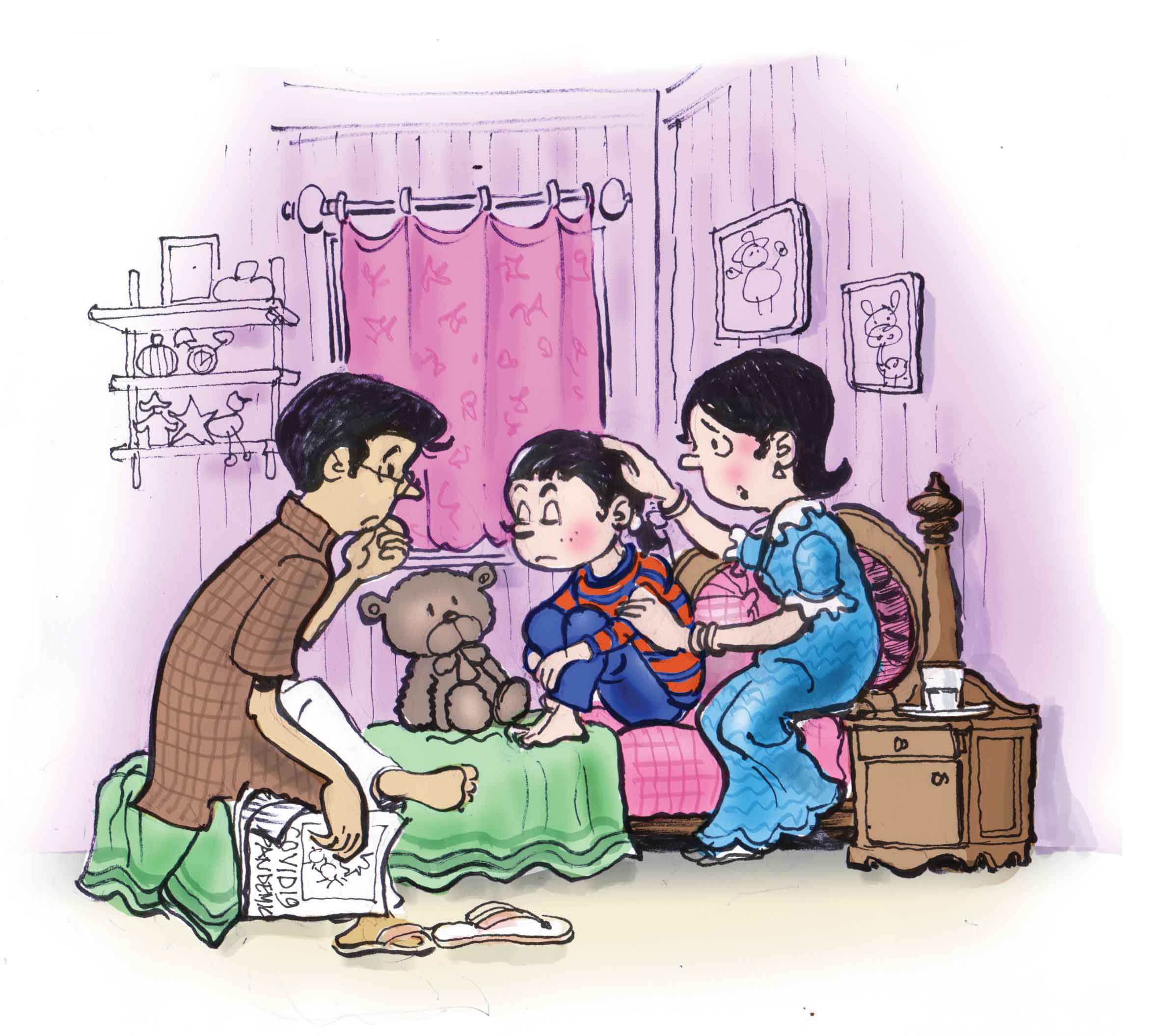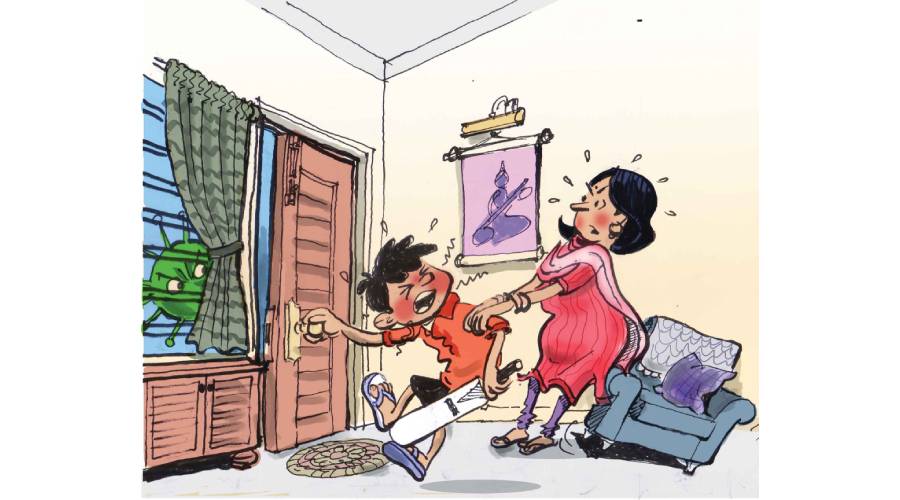Has your otherwise well-behaved five-year-old become excessively naughty since the lockdown? Or has your 10-year-old suddenly gone quiet and withdrawn? Instead of games and cartoons, is he talking of Covid deaths or is he binge eating out of stress?
“Children are usually resilient but the pandemic has been difficult for them to understand. They lack the maturity to accept the drastic changes around us,” said Mila Sengupta, early childhood development trainer and consultant, at a webinar last week. “But every situation — positive or negative — can be turned into a teachable moment if parents learn how.”
The event was organised by a Salt Lake-based NGO, Change Initiatives, that works for children’s education among other issues.
“We decided to hold this webinar after receiving several requests from parents. They badly needed help on managing kids during the pandemic,” said Jhumpa Ghosh, director of the NGO.
The other speaker at the event felt webinars and workshops were good platforms for parents in such situations. “Not only do they learn different ways to approach their problems but they draw assurance from the fact that they aren’t the only ones suffering,” said Subarna Chattopadhyay, a special educator who works with children of a cancer hospital.
Here’s what The Telegraph Salt Lake learnt from the webinar — Tantrums or silent treatment
“Some of the younger kids have become hyperactive, extremely naughty and started misbehaving during the pandemic,” said Chattopadhyay, a resident of GC Block. “This has been out of boredom, frustration or because they know it will make parents give them attention.”
Sengupta described kids throwing tantrums, kicking and screaming, demanding to know why they can’t go out and why no one is allowed to come over.
“But there are also kids who have withdrawn into a shell. Some are even talking of stress and sorrow. The lack of social interaction and the absence of friends are manifesting such behaviour in children,” said the lady who is based out of Texas but is stuck in Calcutta due to the pandemic.
Lack of routine
Since work-from-home parents are in no hurry to go to office they are waking up late and this has sent the entire family’s body clock for a toss.
Kids’ screen time has risen exponentially due to online classes and the lack of alternative entertainment options. Sometimes kid are playing games well past their ideal bed time.
“Often parents approve or even encourage children to study late into the night but this is unhealthy. They would be better off studying during the day,” said Chattopadhyay.
“Children need six to eight hours of sleep a day and lack of sleep can impact the brain as certain hormones are secreted while sleeping. It also helps digestion.”
Exposure to domestic tiffs
“Living with someone 24 hours a day can get on anyone’s nerves and many couples have been arguing or worse during the lockdown,” said Sengupta. “While at other times, kids would be out playing or in school when parents fought, they now have to witness the violence,” said Sengupta.
What parents can do
⦿ Acknowledge your child’s feelings- Do this even if his behaviour is unacceptable. Say something like: ‘I can see you’re upset but you cannot act like this. Do you want to tell me why you are doing this?’ “Then when he starts speaking, be a good listener. Often we start answering and giving advice even before they are done talking. Children want to be heard,” said Sengupta.
⦿ Share your own feelings with them - Parents usually shield kids from their own worries but this is not the right attitude. “Tell the child that you too are confused about the pandemic. That you too want to go out and are fed up of being stuck at home. But that you have no choice since Covid is still a worry,” explained Sengupta. “Your honesty will assure them that it is all right to feel stressed and to talk about it. The child will realise that his own feelings are normal.”
⦿ Make him part of the solution - Kids like to offer their opinion so involve him in setting new pandemic-time rules at home. “Till the previous generation, a father could end a conversation by telling his son: ‘Because I said so!’ but today kids will ask why. Tell him that like school, there are house rules that all have to respect but that he can help set those rules. This will help him become independent and be a problem solver,” said Sengupta.
⦿ Respond positively to needs - Don’t turn to your child only when he’s crying. This applies to babies too. Infants try to communicate by different means but if they see you responding only if they cry, that’s what they’ll do. “As for older kids, offer specific praise. So instead of saying ‘good job!’ say: ‘I saw you help your brother and hug him when he fell down. I’m proud of you!’” said Sengupta. This is the time to create strong bonds with your kids.
⦿ Reduce screen time - Thanks to online class, they are already spending hours staring at the phone so limit their entertainment time on gadgets. “Smaller the screen, the worse it is for the eyes. It’s better that you watch a film with your child on TV and then switch off,” said Chattopadhyay. “Then you can discuss the parts that he didn’t understand.”
The phone should, under no circumstance, be left with the child overnight. “You never know what they access with it on their own. If it needs charging, let it charge overnight in your room. And don’t let the child browse the phone before sleeping as it will get him excited and disturb his sleep pattern,” Chattopadhyay said.

Illustration: Pratik Chakrabarti
Set parental control on the TV, check privacy settings on the phone, cover the computer web cam when not in use and switch to ‘SafeSearch’ on Google to block inappropriate content.
⦿ Team up- If parents aren’t on the same page, kids take advantage of them. “If the mother is more lenient they’ll approach her instead of the dad for something they want,” said Chattopadhyay. “Often parents start blaming each other in front of the child even when they for counselling.”
A mom and dad may disagree, but you can do so agreeably, without creating a scene that impacts.
⦿ Set exercise time- set this for the entire family. If you don’t have space use the balcony or terrace but try to get the child to jump, run, kick, throw etc. Music can work wonders to calms kids and you can play vocal, classical, instrumental or even the sound of the rain or a forest before bed time.
⦿ Manage your own stress- While we’re discussing children, it’s important to realise that adults are more likely to yell and be impatient under stress. “Mothers, particularly, sacrifice their own needs before their family’s so pick the phone and speak to your relatives, friends or neighbours when you feel stressed out,” said Sengupta.
⦿ Be a role model - children are like sponges, watching and learning from you all the time. So you can’t tell him not to play on his phone if you spend every free minute on Facebook.
Lockdown obesity
“Obesity itself has become a pandemic today with over 14 million chidlren in India suffering from it. After China, India has the highest number of obese children and the figure is on the rise,” said Sengupta.
The lockdown has worsened the phenomenon. “Kids who would go for swimming or martial arts classes have had to stop them and our social media feed had got flooded with pictures of the fancy dishes everyone was cooking. Unfortunately, most of those dishes were rich and unhealthy,” reasoned Chattopadhyay.
“Yes the ingredients may have been better than at roadside shops but a fried dish is still fried.”
She also cited how kids had resorted to binge eating out of stress or boredom. “And, of course, no one binges on healthy food.”
Road to obesity
Sengupta explained the typical route to obesity. “A child is born healthy but gets addicted to video games, fast food and long hours of studying and this leads to “mild obesity” in him,” she began.
The condition makes it strenuous for him to perform activities like climbing stairs and so he bypasses them. This in turn pushes the child towards “moderate obesity”.
At this stage exercise is uncomfortable and he neither finds energy nor has the will to engage in any physical activities after school. He ends up with “severe obesity” and grows into an obese adult. This increases his risk of heart problems, diabetes, hypertension and a host of other lifestyle diseases.
“In fact with excess weight gain they develop adipose cells which make it more difficult to lose weight in future and maintain it.”
What causes obesity-
⦿ High fat and sugar in diet - even worse than sugar is refined sugar, which is the white coloured sugar we usually consume. “It is better to have brown sugar, which is available online and in supermarkets these days,” said Sengupta, asking people to start reading the nutritional facts behind food packets. “A can of cola, for instance, has nine teaspoons of sugar!”
Sengupta also clarified the meaning the junk food, which is loved by kids but frowned upon by doctors. “Junk food is that which has sugar, fat but no other nutrition. It is food packed with empty calories. Processed food, too, is best avoided as it has high sodium as preservative and chemicals to preserve colour,” she said.
⦿ Lack of exercise, sedentary nature of recreation - Besides access to too much TV and phones, these gadgets also give access to advertisements showing junk food. “If a child sees an ad for chips 15 times a day he will eventually want to try it. In schools too, the recess time gets shorter in higher classes so kids have less time to play,” said Sengupta.
⦿ Socio-economic background - obesity is three times more likely to occur in urban areas than rural, said Sengupta. “As a family’s standard of living improves, its lifestyle tends to get unhealthy.”
⦿Genetic factors - a child has a higher tendency to get obese if the mother got diabetes during pregnancy.
What you can do-
Don’t stock junk food at home - Chocolate, chips and the like should not be purchased in bulk along with other groceries. If there aren’t any at home, kids cannot eat it.
“Growing kids will get hungry and you cannot ask them not to eat so keep healthy snacks at hand like fruits and nuts,” said Chattopadhyay. Also, don’t deprive them of junk food totally. “They will crave it even more if their friends have it and they are not allowed any. Let them have chocolate once a week, ice cream once in 10 days, for instance.”
Physical activity - Kids need 90 to 120 hours of physical activity a week. “This can be a combination of indoor and outdoor activities, structured as well as free play time…,” said Sengupta, adding how even infants need activity.
So babies crawl, roll, move around freely and explore his environment under adult-supervision. Let him bang a pot with a spoon, let him rest on his tummy and look around.
Don’t body shame them - if your child is obese don’t turn it into a body image issue. “Girls, especially, suffer from this and could be driven to eating disorders like anorexia. So don’t equate losing weight with looking good. Rather, tell them that the objective is to be healthy. Their weight should not affect their self-esteem and confidence in any way,” said Sengupta.
Balanced diet - “There are homes where one kind of food is cooked for adults and another for kids, comprising fries, meats and only the select few items they like eating,” said Sengupta disapprovingly. “Parents claim the kids refuse to eat other dishes.”
No one is born with habits but it is the parents’ onus to instil good eating habits in them, she said. “If you let him eat only junk food he will continue with this his whole life and suffer from poor nutrition.”
Besides what you eat, monitor how much you eat. “Don’t lunge into 10 pieces of chicken or five pastries just because you feel like it,” she said.
Breast feed babies for six months - This is a must as it is directly linked with obesity. “And once the child starts eating solids, do not mix together all dishes and feed him,” said Sengupta. “Rather, feed each dish individually so the child develops a taste for it.”
Ensure co-operation from the family - Often parents try to enforce healthy eating habits in the child but a grandparent interferes, said Chattopadhyay. “‘O toh chele manush, or kichu hobe na,” says the grandma and stuffs the child with all the sweets he wants,” she said.
So it’s important for family members to communicate. “Explain to everyone at home that the diet is for the child’s well-being,” said Chattopadhyay.











